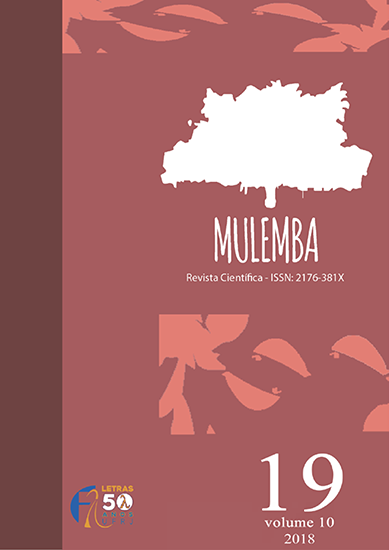Can there be literature of African feminine authorship in the school? A reflection on teachers’ awareness of the matter and absence of Lília Momplé’s work in the school environment
DOI:
https://doi.org/10.35520/mulemba.2018.v10n19a18882Keywords:
teacher knowledge, Lília Momplé, Law 10.639/03.Abstract
The following article traces a reflection on African Portuguese-language productions in the classroom, highlighting the Mozambican writer Lília Momplé. Taking into account the applicability of Law number 10.639 / 03 in the classroom, we also reflect on the knowledge required for teacher education, based on the points raised by Tardif (2007) and associate the lack of visibility that women writers in Portuguese-speaking countries have in the school environment. For this, we highlight the work with two narratives of the author, presenting a vision about these and highlighting work alternatives for the teacher to lead debates around the female condition. Thus, we see Lília Momplé, one of the main voices of Mozambican literature, as one of the ways to work with African texts in the classroom and as one of the voices that need to reach this environment, thus contributing to a greater representation of literary productions of female authorship.
Downloads
References
AFONSO, Maria Fernanda. O conto moçambicano: escritas pós-coloniais. Lisboa: Caminho, 2004.
ALÓS, Anselmo Pers. (2013). Os olhos da Cobra Verde: Lília Momplé revisita o passado colonialista de Moçambique. Revista do Núcleo de Estudos de Literatura Portuguesa e Africana da UFF, 5(10), pp.89-100.
BRASIL. Diretrizes Curriculares Nacionais para a educação das relações ético-raciais e para o ensino de história e cultura afro-brasileira e africana na educação básica. Ministério da educação, 2013.
CANDIDO, Antonio. O direito à Literatura. In: Vários Escritos. 5. ed. Rio de Janeiro: Ouro Sobre Azul, 2011. p. 171-193.
CRUZ, Bernadete Angelina; BERNADETE, Elba Siqueira de Sá; ANDRÉ, Marli Eliza Dalmazo de Afonso. Contexto Contemporâneo: cultura, educação e políticas voltadas aos docentes. In: Políticas Docentes no Brasil: um estado da arte. Brasília: Unesco, 2011. Cap. 2. p. 23-30.
DÍAZ-SZMIDT, Renata. As imagens do feminino na obra de Lília Momplé. In: SILVA, Fabio Mario da. O feminino nas Literaturas africanas em Língua Portuguesa. Lisboa: Clepul, 2014. p. 181-199.
DUARTE, Zuleide. Lília Momplé: estórias de uma história contada com lágrimas. Revista Cerrados, Brasília, v. 19, n. 30, p. 01-18, out. 2010.
EVARISTO, Conceição. (2009). Literatura Negra: uma poética da nossa afro-brasilidade. Scripta, 13(25), pp.17-31.
EVARISTO, CONCEIÇÃO. (n.d.). Literatura Negra: uma voz quilombola na literatura brasileira. Disponível: http://bibliotecavirtual.clacso.org.ar/ar/libros/aladaa/evaris.rtf. Acesso: 8 Jan. 2018.
JOB, Sandra Maria. Em texto e no contexto social: mulher e literatura afro-brasileiras. 2011. 146 p. Tese de Doutorado (Programa de Pós-Graduação em Literatura)- Universidade Federal de Santa Catarina - UFSC , Santa Caratina, 2011.
MOMPLÉ, Lília. Ninguém matou Suhura. Moçambique: Edição da Autora, 2009.
MOMPLÉ, Lília. Os olhos da cobra verde. Moçambique: Diname, 1997.
MONEGON, Patrícia Pinheiro. A África está em nós: contos africanos de Angola e Moçambique em Língua Portuguesa para o ensino de base intercultural. 2015. 147 f. Dissertação (Mestrado) - Curso de Programa de Pós-graduação em Cultura e Sociedade, Universidade Federal do Maranhão, São Luís, 2015.
SILVA, Maria Natalha Morais da; COUTINHO, Douglas Wagner Brasil Maia; SARAIVA, Sueli. Literatura moçambicana e experiência de docência em escolas de ensino médio em Redenção. In: II SEMANA UNIVERSITÁRIA DA UNILAB: PRÁTICAS LOCAIS, SABERES GLOBAIS, 2., 2010, Lisboa. Artigo Científico. Lisboa: Unilab, 2010. p. 01 - 04.
TARDIF, Maurice. Saberes docentes e formação profissional. 8. ed. Petrópolis: Vozes, 2007.
VIEIRA, ALICE. (2008). Formação de Leitores de Literatura na escola brasileira: caminhos e labirintos. Cadernos de Pesquisa, 38(134), pp.441-458.
Downloads
Published
Issue
Section
License
Authors who publish with this journal agree to the following terms:
- Authors retain copyright and grant the journal right of first publication with the work simultaneously licensed under a Creative Commons Attribution License that allows others to share the work with an acknowledgement of the work's authorship and initial publication in this journal.
- Authors are able to enter into separate, additional contractual arrangements for the non-exclusive distribution of the journal's published version of the work (e.g., post it to an institutional repository or publish it in a book), with an acknowledgement of its initial publication in this journal.
- Authors are permitted and encouraged to post their work online (e.g., in institutional repositories or on their website) prior to and during the submission process, as it can lead to productive exchanges, as well as earlier and greater citation of published work (See The Effect of Open Access).

